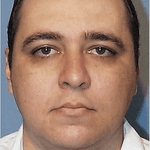
On January 10, 2024, U.S. District Judge Austin Huffaker denied Kenneth “Kenny” Smith’s challenge to Alabama’s intended use of nitrogen gas to execute him. Although Mr. Smith plans to appeal, the ruling currently authorizes Alabama to use its new, untested method of nitrogen hypoxia to execute Mr. Smith on January 25.
Mr. Smith’s case is unusual in several respects. First, he has already survived one execution attempt, which left him with post-traumatic stress disorder, according to a clinical psychologist and trauma expert who examined him. On November 17, 2022, the state tried and failed to execute Mr. Smith using lethal injection but abandoned its efforts after four hours when staff were unable to access a vein.
Second, Mr. Smith would likely not be sentenced to death today. In 1996, a jury recommended that he receive a sentence of life in prison by a vote of 11 to 1, but the judge overrode its recommendation and sentenced him to death. Alabama judges no longer have the ability to override jury sentencing recommendations, so if sentenced today, Mr. Smith would not be facing execution.
Third, unless an appeals court intervenes, Mr. Smith will be the first human being executed using nitrogen gas. The consequences of using this protocol are completely unknown, even to Alabama officials.
Mr. Smith’s legal challenge alleged that aspects of Alabama’s nitrogen hypoxia protocol violated his 1st, 8th and 14th Amendment rights, as well as his religious freedom rights. For example, Mr. Smith alleged that the mask that would be placed over his face would impede his ability to make a final statement or audibly pray; he further contended that the possibility that he would vomit in the mask would create additional risk.
At a hearing on December 20, 2023, the court heard evidence and expert witness testimony from both parties. Mr. Smith argued that his execution would expose him to a “severe risk of a persistent vegetative state, a stroke, or the painful sensation of suffocation, i.e., superadded pain.” To satisfy his legal burden, Mr. Smith also identified “feasible and readily implemented alternatives” that would reduce the risk to him, either by amending Alabama’s protocol or by executing him by firing squad. Alabama argued in response that Mr. Smith’s concerns were speculative and/or otherwise barred and should be dismissed.
In his order, Judge Huffaker wrote that although Mr. Smith had properly pled and raised substantial Constitutional and statutory claims, he was not entitled to a preliminary injunction because he had not shown he was likely to succeed on the merits. Citing the U.S. Supreme Court’s earlier decision in Glossip, Judge Huffaker said that “the fact that little or no evidence and scientific proof on [nitrogen hypoxia as an execution method] existed” did not relieve Mr. Smith of his burden to show that the method creates an unacceptable risk of pain. Likewise, he ruled that Mr. Smith had not shown that the protocol substantially burdens his ability to exercise his religion.
Last week, four United Nations experts expressed alarm over Mr. Smith’s upcoming execution, warning that the state’s intention to kill him with the untested method could subject him to cruel and inhuman treatment amounting to torture. In their joint statement released on January 3, the four independent UN monitors call on the US government and Alabama to halt the execution. “We are concerned that nitrogen hypoxia would result in a painful and humiliating death,” the experts write.
Kim Chandler, Federal judge says Alabama can conduct nation’s 1st execution with nitrogen gas; appeal planned, Associated Press, January 10, 2024; Darryl Coote, Judge paves way for first nitrogen hypoxia execution set for Jan. 25, UPI, January 10, 2024.
Methods of Execution
Oct 31, 2024

Kentucky Supreme Court Denies Attorney General’s Request to Remove Injunction on Executions
Methods of Execution
Sep 10, 2024

Idaho Court Dismisses Longest-Serving Death Row Prisoner’s Post-Conviction Claim Against a Second Execution Attempt
Methods of Execution
Sep 03, 2024
